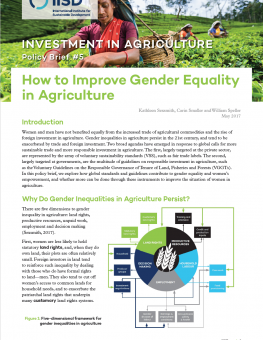
How to Improve Gender Equality in Agriculture: Investment in Agriculture Policy Brief #5
In this policy brief, we explore how global standards and guidelines contribute to gender equality and women’s empowerment, and whether more can be done through these instruments to improve the situation of women in agriculture.
Women and men have not benefited equally from the increased trade of agricultural commodities and the rise of foreign investment in agriculture.
Gender inequalities in agriculture persist in the 21st century, and tend to be exacerbated by trade and foreign investment. Two broad agendas have emerged in response to global calls for more sustainable trade and more responsible investment in agriculture. The first, largely targeted at the private sector, are represented by the array of voluntary sustainability standards (VSS), such as fair trade labels. The second, largely targeted at governments, are the multitude of guidelines on responsible investment in agriculture, such as the Voluntary Guidelines on the Responsible Governance of Tenure of Land, Fisheries and Forests (VGGTs).
In this policy brief, we explore how global standards and guidelines contribute to gender equality and women’s empowerment, and whether more can be done through these instruments to improve the situation of women in agriculture.
You might also be interested in
The Responsible Agricultural Investment Tool for Agribusiness and Case Studies
This report summarizes a collaboration to support agribusinesses in complying with principles of responsible investment in agriculture and food systems.
Why the Energy Charter Treaty Modernization Doesn't Deliver for Climate
The Energy Charter Conference adopted the "modernized" Energy Charter Treaty (ECT) on December 3, 2024. IISD's Lukas Schaugg explains what the modernization does, when it will enter into force, its tension with EU law, and why the reformed ECT can still hinder climate policies.
Sustainable Asset Valuation of the Nutrition Sensitive Agriculture Capacity Strengthening Project in Ethiopia
This report analyzes the social, economic, and environmental outcomes of implementing agroforestry and climate-smart agriculture in Ethiopia.
Good COP? Bad COP?: Food systems at COP29
The 29th United Nations Climate Conference (COP 29) in Baku failed to build on the notable progress made on food systems at COP 28. However, it wasn't all doom and gloom.